Table of Contents
Get started with MyPerfectResume today!
- Build a resume on any device
- Pick an ATS-friendly template
- Tailor with AI copy suggestions
Why this resume works
- Quantifies accomplishments: By presenting measurable accomplishments like a 25% boost in customer satisfaction, the applicant communicates their ability to drive positive outcomes and deliver exceptional service results.
- Uses action-oriented language: Using strong action verbs such as “implemented” and “improved,” the applicant showcases their initiative and effectiveness.
- Illustrates problem-solving ability: Innovative diagnostic strategies that reduced repair time by 30% highlight the applicant’s critical thinking, showcasing problem-solving skills and efficient solutions to complex challenges.
More Automotive Technician Resume Examples
Take a look at our automotive technician resume examples to see how to emphasize your mechanical skills, diagnostic abilities, and hands-on experience. These mechanics resume examples will help you craft a resume that stands out to hiring managers and wins more interviews.
Entry-Level Automotive Technician
Why this resume works
- Effective use of keywords: By incorporating relevant keywords like “vehicle diagnostics” and “engine repair,” the applicant optimizes their resume to pass applicant tracking systems (ATS).
- Shows digital literacy: The applicant’s experience in managing service records highlights computer skills and readiness for digital tasks.
- Centers on academic background: Graduating with a mechanical engineering master’s degree in automotive systems emphasizes the applicant’s strong academic foundation, important for early career advancements in automotive engineering.
Mid-Level Automotive Technician
Why this resume works
- Includes a mix of soft and hard skills: By seamlessly integrating technical skills with interpersonal skills, the applicant effectively reduces customer wait times and trains junior technicians.
- Demonstrates language abilities: Language skills in Spanish, German, and French enable cross-cultural communication, essential for diverse client interactions in automotive repair settings.
- Displays technical expertise: Holding multiple certifications, like ASE Master Technician, showcases the applicant’s deep technical expertise and commitment to staying current in automotive advancements.
Experienced Automotive Technician
Why this resume works
- Focuses on work history: The applicant uses a chronological resume format to detail over a decade of automotive experience, effectively showcasing career progression from technician to leadership roles.
- Showcases impressive accomplishments: By including achievements like reducing vehicle downtime by 30%, the applicant reflects their ability to deliver measurable business impact and operational improvements.
- Lists relevant certifications: Certifications such as ASE Certified Technician and Advanced Vehicle Diagnostics highlight the applicant’s dedication to staying updated in advanced automotive practices.
Automotive Technician Resume Template (Text Version)
Aya Kim
St. Louis, MO 63104
(555)555-5555
Aya.Kim@example.com
Professional Summary
Accomplished automotive technician with 7 years of experience in diagnostics, engine repair, and customer service. Proven track record in enhancing service efficiency and client satisfaction, leveraging skills in preventative maintenance and inventory management.
Skills
- Diagnostic tools proficiency
- Engine repair expertise
- Preventative maintenance
- Hydraulic systems knowledge
- Inventory management
- Braking systems proficiency
- Customer service excellence
- Vehicle electrical systems
Certifications
- Certified Automotive Technician – National Institute for Automotive Service Excellence
- Advanced Engine Performance – Society of Automotive Engineers
Education
Master of Science Automotive Engineering
Michigan State University East Lansing, MI
May 2017
Bachelor of Science Mechanical Engineering
University of Michigan Ann Arbor, MI
May 2015
Work History
Automotive Technician
Precision Auto Works – St. Louis, MO
January 2024 – August 2025
- Diagnosed 200+ vehicle issues monthly.
- Increased service efficiency by 15%.
- Enhanced customer satisfaction rates by 25%.
Vehicle Maintenance Specialist
MotorTech Services – St. Louis, MO
January 2020 – December 2023
- Reduced repair time by 30%, saving costs.
- Managed inventory worth $50K monthly.
- Implemented diagnostic strategies for 300+ cars.
Automobile Service Consultant
SpeedyCar Repairs – St. Louis, MO
January 2018 – December 2019
- Facilitated client feedback, improved services.
- Trained junior technicians, boosting work quality.
- Enhanced sales up to 20% in spare parts.
Languages
- Spanish – Beginner (A1)
- German – Beginner (A1)
- French – Intermediate (B1)
Related Resume Guides
Advice for Writing Your Automotive Technician Resume
Discover essential tips on how to write a resume that highlights your mechanical skills, hands-on experience, and passion for automobiles. Whether you’re tuning engines or troubleshooting electrical systems, learn how to put your best foot forward in crafting a resume tailored just for you.
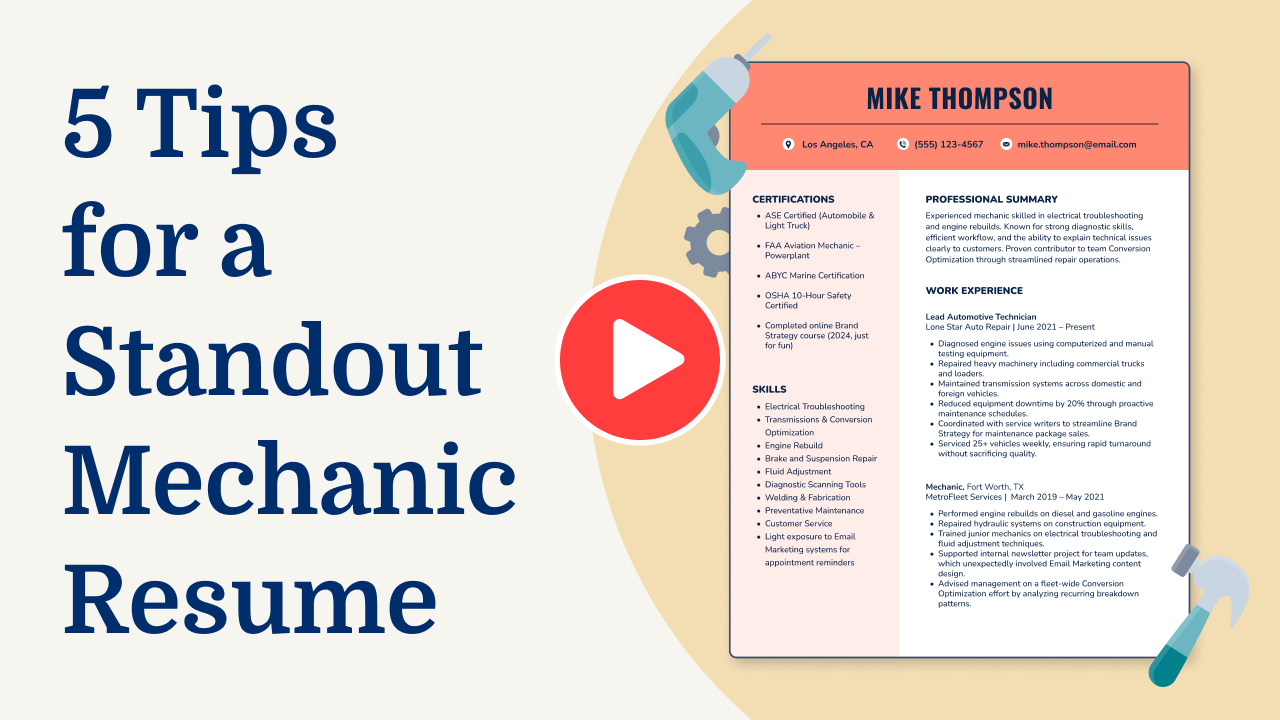
Highlight relevant technical skills
For an automotive technician, technical skills are important because they help you fix and maintain cars efficiently. It’s wise to create a skills section on your resume so employers can quickly see what you know how to do. Additionally, mention these skills in the work experience section by demonstrating how you’ve applied them on the job.
Common technical skills for automotive technicians include engine repair, brake systems, suspension and steering, electrical systems, and diagnostics. Familiarity with tools like diagnostic machines is also key. Stay updated with new car technologies since vehicles are constantly evolving.
When writing about your skills, keep it simple but clear. Include abilities like working with hybrid engines or understanding computer-based auto systems if applicable. Remember to showcase not just what you can do but also how you’ve used these skills in real work situations. This approach helps illustrate your hands-on experience as an automotive technician.
Example of a technical skills section
- Diagnostic tools (OBD-II, multimeters, scan tools)
- Automotive repair and maintenance
- Engine performance tuning
- Brake and suspension systems
- Electrical systems troubleshooting
- HVAC system repair
- Transmission diagnostics and repair
- Hybrid and electric vehicle technology
- Fuel injection systems
- ASE certification standards
You can use our Resume Builder to craft a resume that highlights technical skills in addition to key soft skills like teamwork, communication, and adaptability.
Quantify your accomplishments
Quantifying accomplishments in a resume makes it more appealing because it highlights the actual impact you’ve had in your previous roles. For an automotive technician, this means listing not just what you did, but how well you did it. Instead of saying you “repaired vehicles,” you could say you “increased repair efficiency by 20% through streamlined diagnostic procedures.”
In the work experience section, always list your job title, employer name, location, and employment dates. Use action verbs to describe your duties as accomplishments with measurable results. For example, instead of writing “performed regular maintenance,” you might write “conducted over 50 vehicle inspections monthly, reducing customer wait time by 30%.”
Using metrics helps hiring managers quickly assess your impact and skills. They can see not just that you’ve worked as an automotive technician but also how you’ve contributed to past employers’ success. This way, your resume stands out by clearly showing why you’re a strong choice for the job.
5 automotive technician work history bullet points
- Diagnosed and repaired complex engine issues, improving vehicle performance by 25% and reducing customer return visits.
- Conducted routine maintenance on over 50 vehicles monthly, increasing service efficiency by 40%.
- Used advanced diagnostic tools to identify electrical system failures, decreasing repair time by 30%.
- Implemented a streamlined inventory management process, cutting parts retrieval time by 15%.
- Collaborated with a team of technicians to complete a high-volume repair project 3 days ahead of schedule.
Need help getting started on your resume? Check out our professional resume examples to see how to organize your skills and make your experience stand out.
Write a powerful professional summary
A professional summary on a resume serves as an introduction to hiring managers, offering a snapshot of your career highlights. It’s important to choose between a summary and an objective based on your experience level and career goals.
A professional summary is typically three to four sentences long and focuses on your experience, skills, and achievements. It is best suited for experienced applicants who have established their professional identity and wish to show the value they bring to a role. Highlighting what you’ve accomplished sets the stage for what you can do in the future.
On the other hand, resume objectives are statements of career goals suited for entry-level applicants, career changers, or those with employment gaps. They focus on what you aim to contribute rather than past accomplishments. Next, we will provide examples of both summaries and objectives tailored for different industries and experience levels.
Automotive technician resume summary examples
Entry-level
Recent graduate with an associate degree in automotive technology and ASE certification. Completed internships focusing on basic diagnostics, repair tasks, and preventive maintenance. Familiar with modern diagnostic tools and committed to quality service and customer satisfaction.
Mid-career
Skilled automotive technician with over six years of experience in both dealership and independent shop environments. Proven track record in diagnosing complex mechanical issues, performing repairs on various vehicle systems, and improving performance through advanced tuning techniques. Holds multiple ASE certifications and known for reliability and precision.
Experienced
Seasoned automotive technician with 15+ years in the industry, specializing in hybrid and electric vehicle technology. Experienced team leader adept at managing service teams to deliver timely repairs while maintaining high customer satisfaction scores. Recognized for contributions to shop efficiency improvements and mentoring junior technicians.
Automotive technician resume objective examples
Recent graduate
Detail-oriented automotive technology graduate with hands-on training in vehicle diagnostics and repair seeking an entry-level automotive technician position. Eager to contribute technical skills and a strong work ethic to a dynamic auto service team, while continuing to grow within the industry.
Career changer
Resourceful professional transitioning from retail management into automotive technology, bringing excellent problem-solving skills and customer-focused service. Looking to apply newly acquired mechanical knowledge in an automotive technician role, committed to delivering reliable vehicle maintenance and repair.
Entry-level with certifications
Certified automotive technician with expertise in brake systems and engine performance, eager to join a reputable auto service center. Dedicated to using technical certifications and practical experience to ensure vehicles operate at peak performance for customer satisfaction.
Use a polished and professional resume format that aligns with your experience level to ensure your skills and qualifications stand out to hiring managers.
Showcase your credentials
Listing your credentials, such as certifications, licenses, and specialized training, is important for an automotive technician because it shows you have the skills to do the job well. These credentials prove that you have completed specific courses and passed exams related to auto repair and maintenance.
They help employers see that you are qualified and can handle technical tasks safely and effectively. Create a dedicated certifications section on your resume where these can be listed prominently. Here are a few examples of certifications to list on your resume:
- ASE Certified Master Technician
- EPA Section 609 Certification
- Automotive Service Excellence (ASE) A1-A9 Certifications
- OEM Specific Training (e.g., Ford, GM, Toyota)
- Automotive Technology Diploma or Degree
Having these certifications shows that you are committed to learning and staying updated with new technologies in the automotive industry. It also gives potential employers confidence in your abilities to perform complex repairs and diagnostics.
Example of a certifications section
ASE Master Automotive Technician
Issued by: National Institute for Automotive Service Excellence (ASE)
Expires 2025
EPA Section 609 Certification
Issued by: Environmental Protection Agency (EPA)
Issued 2022
Automotive Service Consultant Certification
Issued by: National Institute for Automotive Service Excellence (ASE)
Expires 2024
Ford Certified Diesel Mechanic
Issued by: Ford Motor Company
Issued 2021
GM Master Technician Certification
Issued by: General Motors (GM)
Expires 2023
Using a resume template with concise formatting, professional fonts, and a simple design ensures recruiters focus on your experience and skills without distractions.
FAQ
Do I need to include a cover letter with my automotive technician resume?
Yes, including an automotive technician cover letter with your resume can increase your chances of landing an interview.
A cover letter allows you to emphasize specific skills, like diagnostics or repair expertise, and explain how they align with the duties of the role you’re applying for.
For instance, if the shop specializes in performance upgrades or electric vehicles, highlight your experience in these areas to show your enthusiasm and readiness for the position.
Consider using our Cover Letter Generator to craft a personalized cover letter that showcases your strengths and aligns with industry standards.
Additionally, reviewing cover letter examples can provide inspiration and guidance on how to effectively structure and communicate your qualifications.
How long should an automotive technician’s resume be?
For an automotive technician, a one-page resume is typically sufficient to showcase your skills and experiences. Focus on key areas like diagnostic expertise, hands-on repair capabilities, and familiarity with automotive technologies. Highlight any certifications relevant to the industry, such as ASE certification.
If you’ve accumulated extensive experience or specialized training that sets you apart from others, a two-page resume might be more appropriate. This allows you to delve deeper into your accomplishments without overcrowding the document.
Ultimately, how long a resume should be depends on your experience level—make sure every detail adds value and clearly reflects your competencies in the automotive field.
How do you write an automotive technician resume with no experience?
If you’re creating a resume with no experience for an automotive technician position, focus on highlighting your skills, education, and any relevant training that shows you’re ready for the role. Here are some tips to help you craft a strong entry-level resume:
- Emphasize your education: Start by listing your automotive technology degree or certification from a technical school, including the name of the institution and graduation date.
- Include hands-on training: Detail any practical training or workshops you completed during your studies. Mention specific tasks like engine repair, diagnostics, or brake system maintenance.
- Showcase relevant skills: Highlight transferable skills such as problem-solving, attention to detail, and mechanical aptitude. Also include any soft skills like teamwork and communication that are valuable in an automotive setting.
- Mention volunteer work or internships: If you’ve volunteered at community car repair events or interned at a garage, list these experiences. Describe the responsibilities you handled, like basic repairs or assisting senior technicians.
Check out our comprehensive guide on writing a resume with no experience for more examples and practical advice from Certified Professional Resume Writers.
Rate this article
Automotive Technician
Share this page
Additional Resources

Automotive Technician Cover Letter Example + Tips
People love their cars. When problems arise, they want to leave their cars with a professional they hope they can trust. A good automotive technician cover letter will demonstrate that
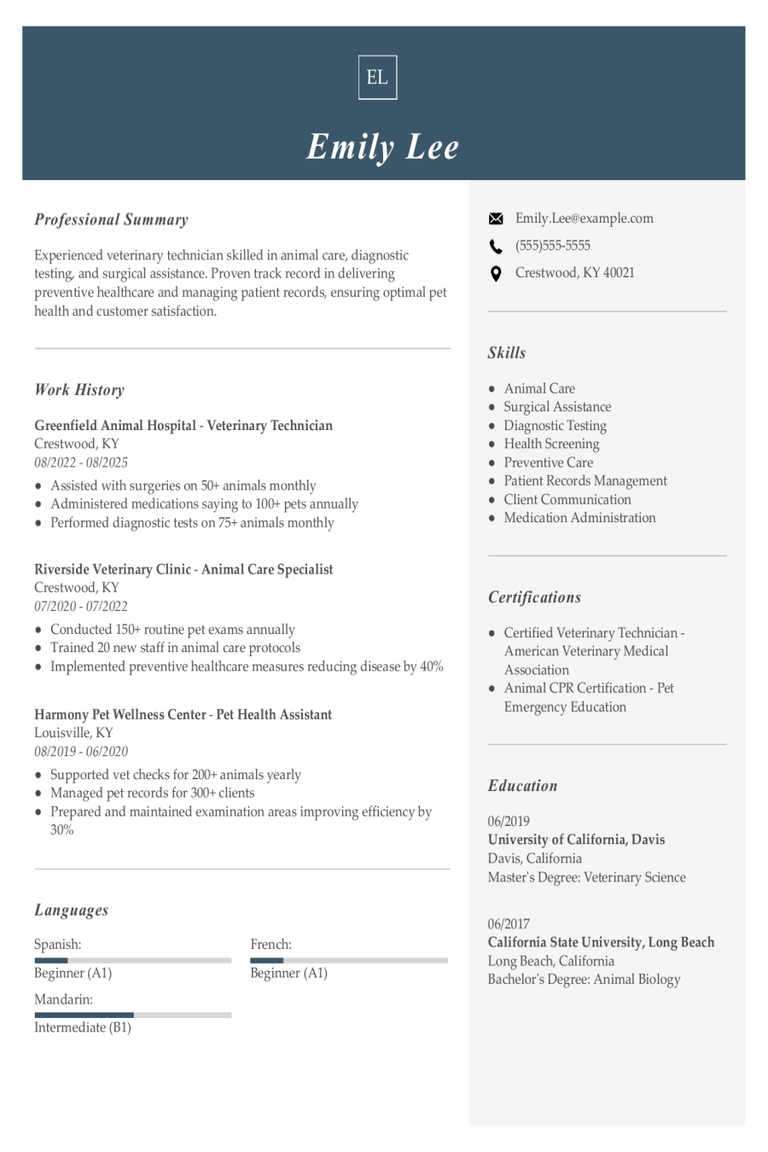
Veterinary Technician Resume Examples & Templates
Explore veterinary technician resume examples and tips to learn how to showcase your experience caring for animals, assisting vets, and handling lab tests. These samples and tips will help you
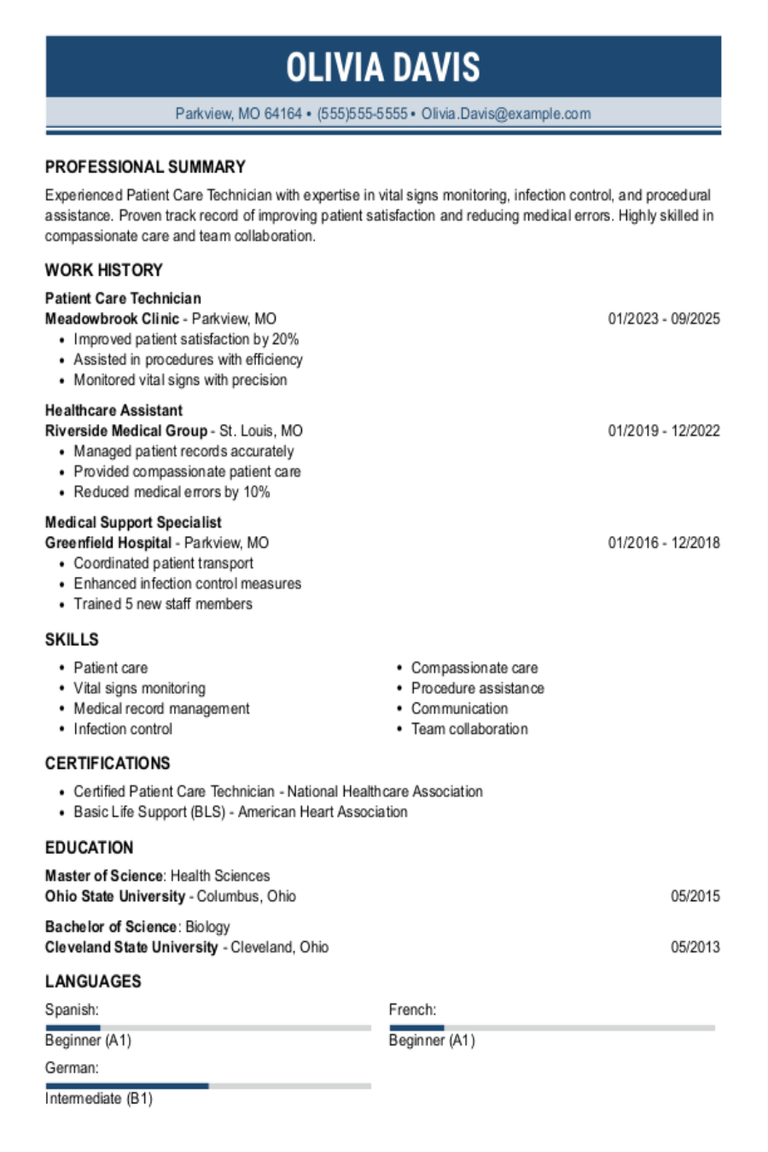
Patient Care Technician Resume Examples & Templates
Explore patient care technician resume examples to see how to highlight your skills in assisting patients, monitoring vital signs, and supporting medical staff. Discover tips for showcasing your experience in
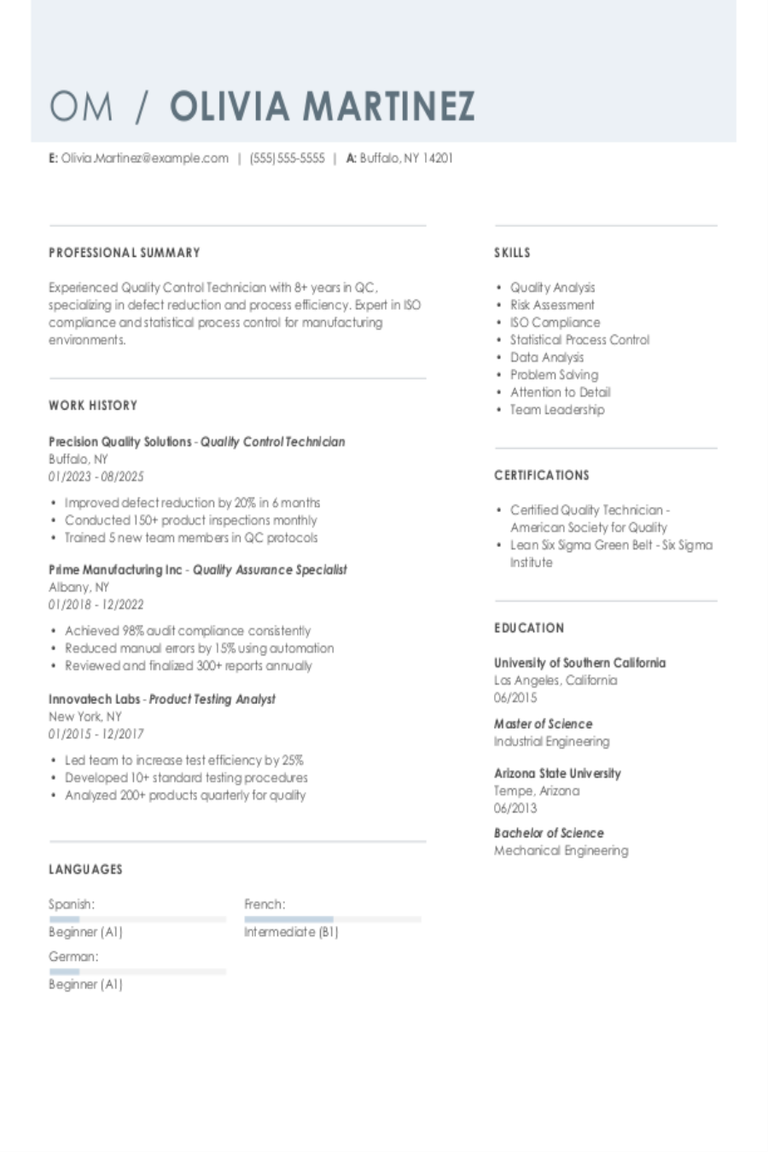
Quality Control Technician Resume Examples & Templates
Browse quality control technician resume examples to see how to list your skills in testing and inspection. Discover tips on sharing experiences that demonstrate attention to detail and problem-solving abilities
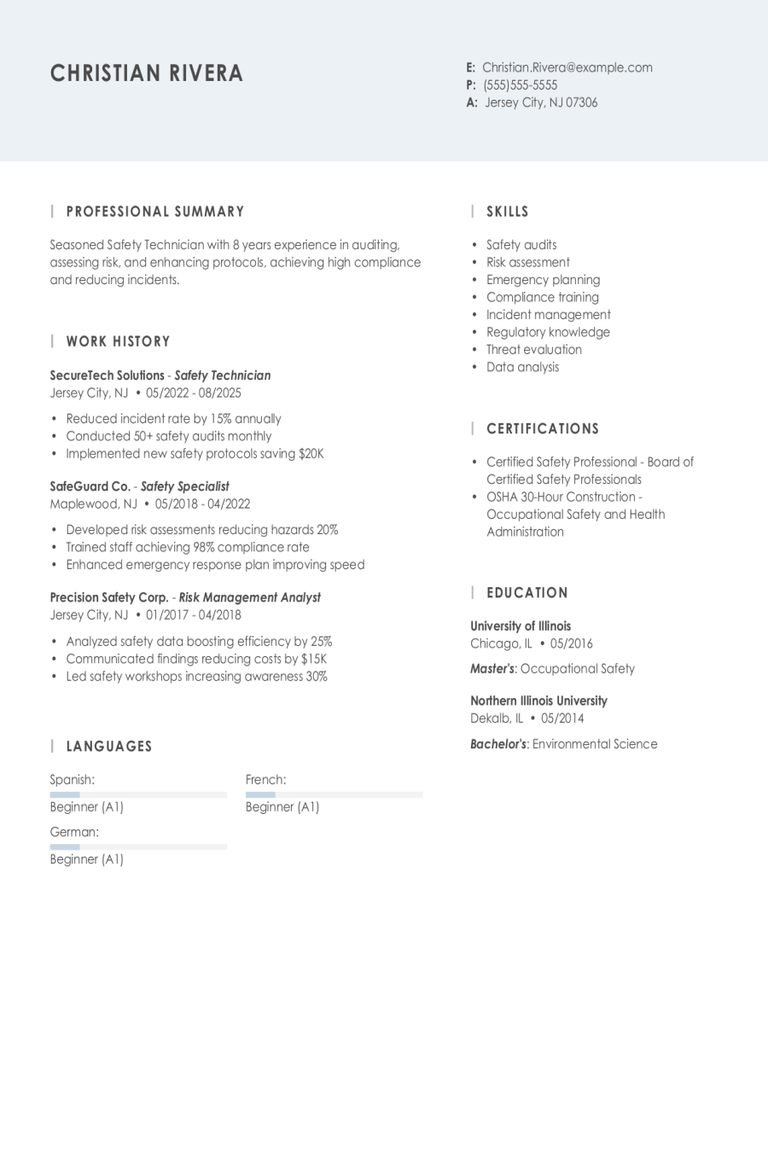
Safety Technician Resume Examples & Templates
Explore safety technician resume examples that focus on skills like problem-solving, equipment checks, and teamwork. These examples and tips will help you show employers you’re ready to keep workplaces safe
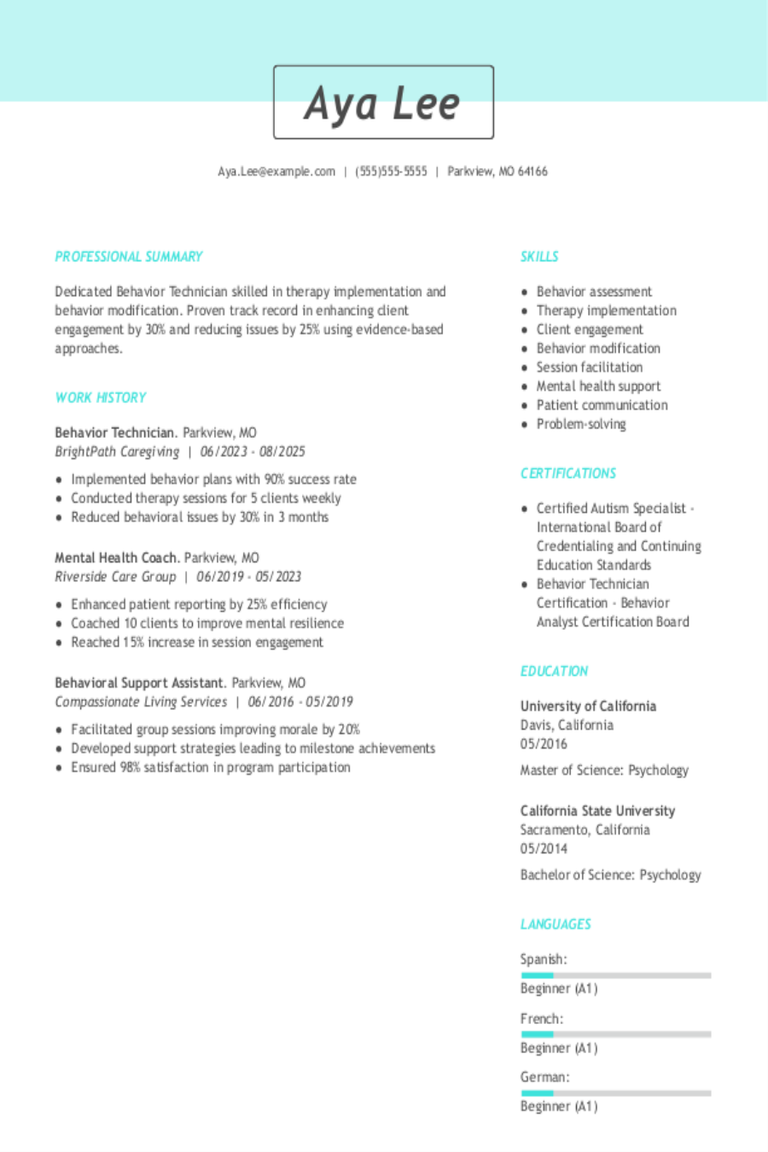
Behavior Technician Resume Examples & Templates
Discover behavior technician resume examples and learn how to showcase your hands-on experience and make a great impression on potential employers.Build my resumeImport existing resumeCustomize this templateWhy this resume worksQuantifies
